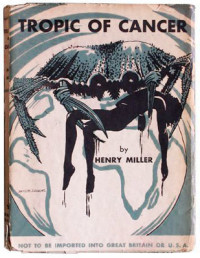Tropic of Cancer
by Henry Miller
Banning History:
Tropic of Cancer was written by Miller in the 1930’s, but would take thirty years (1934-1964) before it was consented for publication in the United States. Tropic of Cancer was only read in the states by those curious and brave enough to smuggle it in. Themes of pornography, obscenity, vulgarity and pure disgust pervade the novel making its initial admittance into the minds of American readers so difficult to condone by the officials of censorship. The United States government said the work was too explicit and challenged sexual morality. Pennsylvania Supreme Court Justice Michael Musmanno put it this way, “Tropic of Cancer is not a book. It is a cesspool, an open sewer, a pit of putrefaction, a slimy gathering of all that is rotten in the debris of human depravity.” The government went even further to ban all of Miller’s works. The ban on Miller’s work was finally lifted by 1961, but obscenity laws and challenges still existed surrounding its distribution. In 1961, Chicago police threatened arrest to bookstores who sold Tropic of Cancer. The publisher Grove Press and American Civil Liberties Union challenged officials and filed a lawsuit against the illegal nature of interfering with the distribution of the novel. Finally in 1964 the U.S. Supreme Court declared Tropic of Cancer not obscene. It’s sale and distribution was now protected by the U.S. constitution.
Author Bio
Henry Valentine Miller was born 1891 in Yorkville, Manhattan to parents of Lutheran German descent. They moved later to the Williamsburg and then Bushwick neighborhoods of Brooklyn where he spent most of his youth. Miller was active in the Socialist Party of America. His quondam idol was the radical intellect Hubert Harrison whose auto-didactic, class consciousness and secular humanist perspectives laid a strong foundation for Miller rooted in free thought and self education. Miller attended the City College of New York for one semester, but prefered aforementioned roads to self-actualization. Along the way of his journey, he fought the mediocre life of poverty and supplemented his time with many mundane jobs. Miller did not start to write until his thirties-he struggled at first and did not come to meet full dedication to the form until he moved to Paris in 1930. Miller wrote to a friend soon after stating, “I start tomorrow on the Paris book: First person, uncensored, formless - fuck everything!” This approach to writing in the semi-autobiographical unrestrained matter was unprecedented. Miller was fascinated with art as well and painted watercolor in the vogue of surrealism that his writing reflected in a stream of consciousness motif. Miller balanced the cerebral with the physical, loved to ride his bicycle and took long walks with spurts of rigor and meditation. He had a genuine interest in people, would listen with a curious ear and attentive eye of which both had a soft spot for pleasure. Deemed by Karl Sharpiro as a Wisdom writer, producing works that lived between literature and scripture. And with this type of application there was a type of reverence in title; Ghandi with a penis.
Discussion Questions
How are women portrayed? Do they symbolize anything?
What does the title have to do with the content?
What is the point of this novel, is there one?
What does the narrator mean by inhuman? Why does he have respect for them?
In what way does the narrator’s sexual liberty relate to larger liberties?
